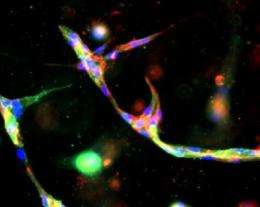Scientists make cancer breakthrough in the way anti-cancer drugs are tested

Scientists at the University of East Anglia have made an important breakthrough in the way anti-cancer drugs are tested.
A tumour cannot grow to a large size or spread until it has developed its own blood supply and leading research has looked for a way of halting capillary formation to stop tumours taking hold.
But new findings published today in the Journal of Cell Science have shown that scientists testing such treatments may not have been studying exactly what they thought they were.
The research proves that cells are able to switch their genetic profile – turning off genes expressed by blood vessel cells and turning on genes specific to lymphatic cells.
This "switch" was previously thought to be impossible and means that scientists may have been researching lymphatic cells, rather than blood vessel cells. It is hoped the discovery will propel the race to find revolutionary new treatments.
Lead author Dr Lin Cooley, said: "It has always been thought that cells could not change from blood to lymphatic vascular cells.
"Other researchers have been doing experiments thinking they were looking at blood vessel cells, when in fact they were looking at lymphatic vascular cells. This breakthrough is important because they have not been studying what they think they have been studying.
"It is a big discovery and will be very important in testing potential anti-cancer drugs."
Researchers used human vein cells in experiments where they form capillaries - the smallest of the body's blood vessels - when cultured in various environments similar to the body.
The human vascular system is made up of two separate circulatory networks – the blood and lymphatic vasculature. Blood vessels and lymphatic vessels are structurally similar, but have very different roles, and are made up of two distinct cell types.
Dr Cooley said: "We have discovered that when vein cells form tube structures, they appear to "switch" their genetic profile, turning off genes expressed by blood vessel cells, and turning on genes specific to lymphatic vessels.
"This change can be reversed, and is dependent on the particular environment they are cultured in.
"We have also shown that their identity changes in response to the cell's environment rather than only being specified by signals during early embryonic development".













